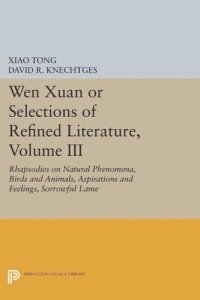
Ebook: Wen xuan or Selections of Refined Literature, Volume III: Rhapsodies on Natural Phenomena, Birds and Animals, Aspirations and Feelings, Sorrowful Laments, Literature, Music, and Passions
Author: Xiao Tong, David R. Knechtges
- Series: Princeton Library of Asian Translations, 64
- Year: 2014
- Publisher: Princeton University Press
- Edition: Course Book
- Language: English
- pdf
The Wen xuan, compiled by Xiao Tong (501-531) is the oldest surviving anthology of Chinese literature arranged by genre. It contains a total of 761 pieces of prose and verse by 130 writers from the late Zhou dynasty to the Liang dynasty (ca. 4th century B.C. to 6th century A.D.) The selection includes most of the best examples of fu (rhapsodies) and shi (lyric poems) from the Han, Wei, Jin, and North-South Dynasties periods, as well as representative examples of other early genres such as letters, memorials, prefaces, imperial edicts, inscriptions, epitaphs, laments, elegies, and eulogies.
This anthology was one of the primary sources of literary knowledge for educated Chinese in the premodern period, and it is still an essential work for specialists in classical Chinese literature. This volume completes the translation of the rhapsodies (chapters 13 through 19) and includes many important masterpieces of early Chinese literature such as the "Rhapsody on Literature" by Lu Ji, "Rhapsody on Contemplating the Mystery" by Zhang Heng, "Rhapsody on Dance" by Fu Yi, and "Rhapsody on the Zither" by Xi Kang.
Originally published in 1996.
The Princeton Legacy Library uses the latest print-on-demand technology to again make available previously out-of-print books from the distinguished backlist of Princeton University Press. These editions preserve the original texts of these important books while presenting them in durable paperback and hardcover editions. The goal of the Princeton Legacy Library is to vastly increase access to the rich scholarly heritage found in the thousands of books published by Princeton University Press since its founding in 1905.